Meet the 2024 Distinguished Teaching Award winners
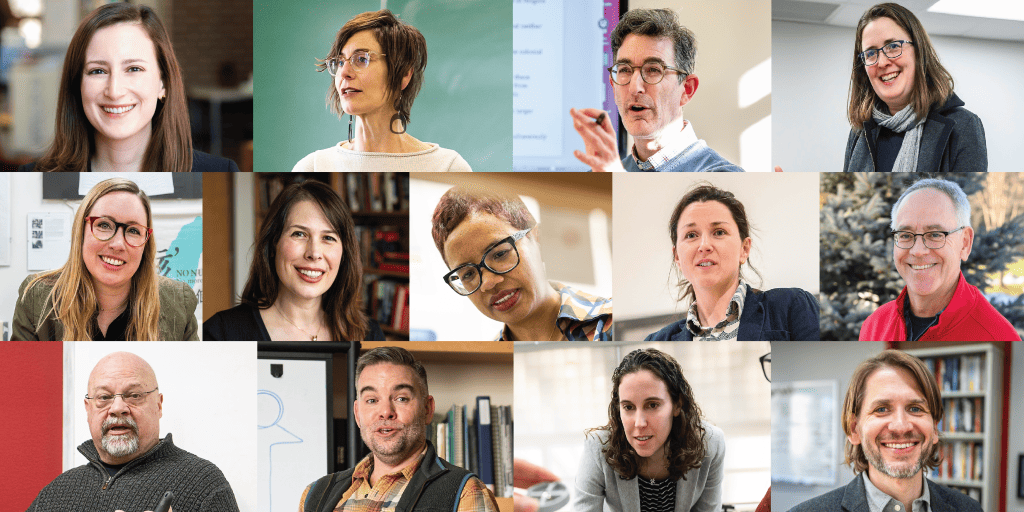
Thirteen faculty received recognition for their outstanding work in the classroom. Top row: Emily Machado, Annie Menzel, Neil Kodesh, Sarah Ensor. Middle row: Katherine Jensen, Sarah Clayton, Aurélie Rakotondrafara, Hilary Dugan, Jerome Clark. Bottom row: Doug McLeod, Travis Wright, Hannah Blum, Derek Johnson. Photos: Althea Dotzour, Sarah Maughan, Jeff Miller, Bryce Richter
Thirteen faculty members have been chosen to receive this year’s Distinguished Teaching Awards, an honor given out since 1953 to recognize some of the university’s finest educators. A ceremony will take place at 5 p.m. April 16 in the Great Hall of the Memorial Union. Campus and community members are invited to attend; RSVP by March 22.
CHANCELLOR’S DISTINGUISHED TEACHING AWARD
Professor of anthropology
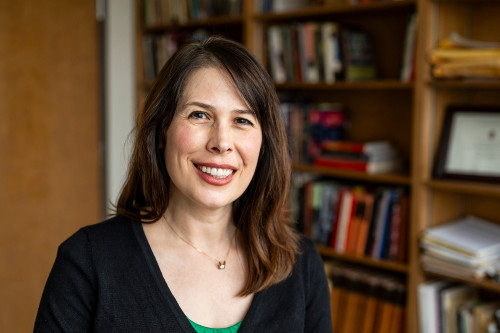
Sarah Clayton is pictured in her office in Sewell Social Sciences Building. Photo: Jeff Miller
Clayton excels in both classroom and field teaching, in part because she works hard to bring the hands-on engagement of field learning to the classroom and the intellectual framing of the classroom to the field. At her long-term field research site near Teotihuacan, Mexico, she has mentored undergraduate and graduate students to become skilled archaeologists and community-engaged researchers. Her project offers professional training opportunities for students from the U.S. and Mexico and participants from the local community. Clayton’s teaching reflects her wide-ranging intellectual and research interests, inspiring and benefiting her students. While the topics deal with the archaeological past, her research and courses make explicit linkages with the concerns of present-day societies.
CHANCELLOR’S DISTINGUISHED TEACHING AWARD
Professor of communication arts
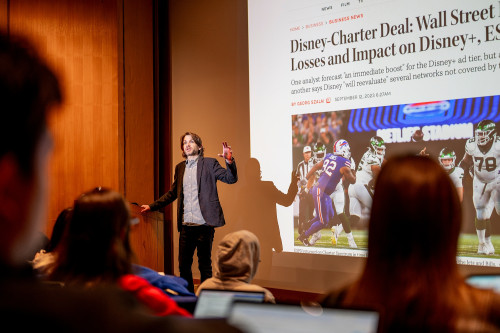
Derek Johnson teaches a class in the Elvehjem Building. Photo: Jeff Miller
Since joining the faculty in 2011, Johnson has had a transformative impact on undergraduate education, graduate education and the culture of teaching within the Department of Communication Arts. One example is CA 547: Digital Games Cultures, one of the popular courses Johnson developed for the department. Rather than a series of traditional assignments, Johnson turned the course into a play-based experience meant to simulate a video game. The result is a tremendously fun course for students that advances the learning outcomes and encourages student reflection on the subject matter at every step along the way. He also challenges students to be critical about the media they consume and the systemic inequalities in the media industries. Given that many undergrads will go on to work in these very same industries, Johnson’s courses have a significant impact not just on students in the program, but also on the future executives, managers, screenwriters and showrunners who will define these industries for the next generation.
CHANCELLOR’S DISTINGUISHED TEACHING AWARD
Professor of history
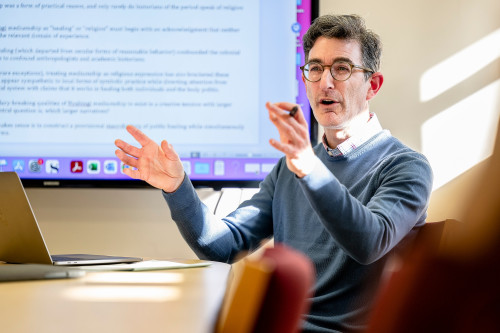
Neil Kodesh leads a discussion with his students in a graduate seminar classroom in the Humanities Building. Photo: Jeff Miller
Kodesh has made extraordinary contributions to the teaching mission of the university through his engaging and accessible pedagogical style, his devotion to mentoring and his commitment to fostering collaboration across departments, disciplines, institutions and continents. Few students come to UW–Madison believing that Africa is immediately relevant to their lives. And yet, in his classes, particularly the high-enrolling, cross-listed “History 277: Introduction to African Studies,” Kodesh shows them that it is — or it should be. His devoted students consistently comment on how he brings African history alive, something they may never have studied in a formal setting before. He has an abiding commitment to creating an inclusive climate for all students and has worked closely with the Global Gateway program, which allows students with financial need to access study abroad programs. Kodesh prioritizes equity, recognizing everyone’s unique contributions.
CHANCELLOR’S DISTINGUISHED TEACHING AWARD
Professor of journalism and mass communication
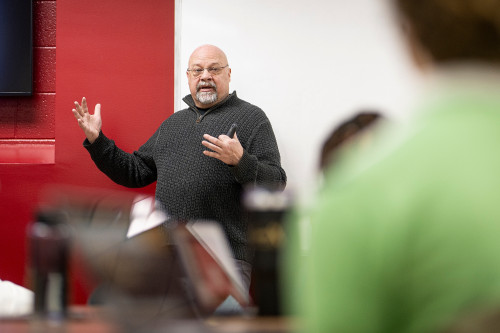
Doug McLeod teaches a class in Vilas Hall. Photo: Bryce Richter
McLeod has a worldwide reputation as a leading scholar of the interplay between media and democratic citizenship, specializing in the study of how news coverage of social conflict affects audiences’ thoughts, feelings and actions. He strives to innovate curriculum to stay current with the rapid changes reshaping the mass media system, media-related industries and the scholarly study of these transformations. McLeod initiated the development and implementation of a new sports communication certificate that has proven to be among the most popular SJMC offerings, enrolling hundreds of undergraduate students and preparing them for careers in sports broadcasting, writing, marketing and management, all growing career domains. He emphasizes experiential learning, where undergraduate and graduate students apply the ideas they encounter to real world problems, often through social research. As a scholar deeply attentive to the power of media to both inform and distort, McLeod centers his teaching in an abiding concern for creating ethical communication serving the public interest.
CHANCELLOR’S DISTINGUISHED TEACHING AWARD
Associate professor of plant pathology
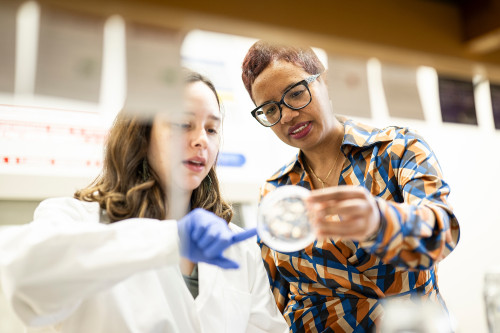
Aurélie Rakotondrafara, right, talks with a student in Rakotondrafara’s lab in the Russell Laboratories building. Photo: Bryce Richter
The core of Rakotondrafara’s teaching philosophy lies in the continuous integration of innovative teaching practices to fit the needs, interests and educational levels of her students. She possesses a deep understanding of the diverse needs of her students, allowing her to tailor instructional methods for student comprehension and retention, setting a high standard for inclusivity in her field. This commitment to inclusivity and to ensuring that every student feels valued and actively involved in the learning process has resulted in remarkable gains in student participation and achievement, fostering an equitable educational experience. Rakotondrafara uses innovative teaching approaches such as interactive online platforms, multimedia resources and gamification. These practices have transformed classrooms into vibrant places of active learning, promoting critical thinking, creativity and student ownership of their educational journey.
CHANCELLOR’S INCLUSIVE EXCELLENCE TEACHING AWARD
Assistant professor of English
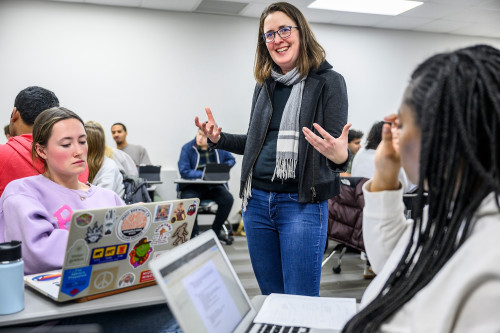
Sarah Ensor, center, teaches an Intro to Environmental Humanities class in Van Hise Hall. Photo: Althea Dotzour
A leading voice in the field of queer ecologies, Ensor teaches self-designed courses in environmental humanities and American environmental literature, with an emphasis on gender and sexuality. She makes challenging literary and philosophical texts interesting and accessible to all students, igniting curiosity, critical thinking and ethical attentiveness. Ensor instills the idea that literature is a powerful tool for both understanding the world and enacting change. Her pedagogical approach goes beyond imparting knowledge; it creates a space for students to evolve intellectually. Ensor understands the classroom as a space of collaboration, both among the students and between the students and herself. She seeks to enfranchise them as each other’s best teachers, and ultimately to make their collective work a project that they can continue even after the class has ended.
CHANCELLOR’S INCLUSIVE EXCELLENCE TEACHING AWARD
Assistant professor of curriculum and instruction
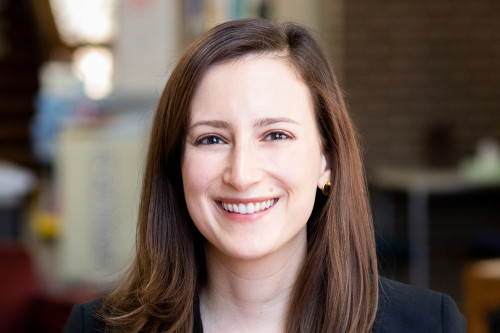
Emily Machado is an assistant professor of curriculum and instruction. Photo by Sarah Maughan / UW–Madison School of Education
Machado brings her rich scholarly perspectives to the classroom, creating space for her graduate and undergraduate students to grapple with how to create equitable, inclusive and humanizing education for young multilingual children as they expand their abilities to read and write. She excels in building relationships with students and creating classroom environments of care and support. Machado prioritizes student interaction and creates assignments that consider student interests. She seamlessly blends theory and practice, weaving into her instruction critical ideas and concepts with examples from her own experiences as a teacher and researcher of young children. She helps students make connections with their own lives and experiences, and apply what they are learning to educational contexts and their own future careers. Machado brings joy to learning and fosters excitement among students for education and their own pathways as educators.
CHANCELLOR’S TEACHING INNOVATION AWARD
Assistant professor of civil and environmental engineering
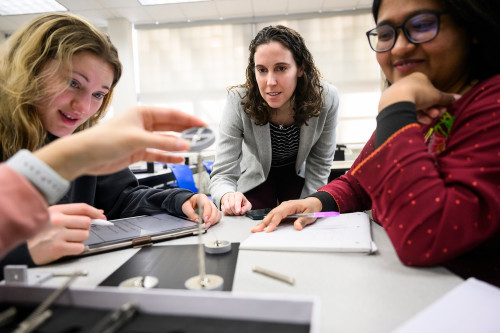
Hannah Blum, center, teaches Civil Engineering 545 (Steel Structures II) in Engineering Hall. Photo: Althea Dotzour
Blum uses virtual and mixed reality learning exercises to keep students engaged and help them visualize the work they’ll do as structural engineers. Students in her Steel Structures course take virtual reality building tours, allowing them to see what a real construction site looks like. It’s a promising alternative to physical tours, which can be difficult to plan due to access, timing, travel and safety issues. Students say they retain more than if the same information was presented in a typical slideshow format. They also say these virtual tours help stimulate their interest in the design of steel structures. With an eye toward the future, Blum established the first Virtual and Mixed Reality Teaching Laboratory in the College of Engineering, a valuable resource for students as well as colleagues. Blum also serves as an important role model for women in the structural engineering discipline. Her presence coincides with an increased number of women students in construction and structural engineering courses.
CLASS OF 1955 TEACHING EXCELLENCE AWARD
Associate professor of gender and women’s studies
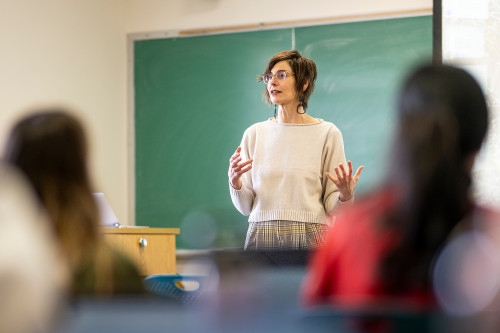
Annie Menzel teaches a Childbirth in the US class session. Photo: Bryce Richter
Menzel is a dedicated and talented teacher who has developed new and exciting courses for Gender and Women’s Studies, updated some of the long-established intermediate and advanced courses and brought energy and inspiration to one of the introductory courses. Peers and students alike affirm the quality, creativity and effectiveness of her instruction. Menzel approaches her teaching and interactions with compassion, patience and intention. She has actively sought out resources, such as the Discussion Project, to deepen her repertoire as a facilitator of inclusive and generative class discussions, and enrich student learning from 100-level to advanced undergrad and graduate courses. It is evident throughout her courses that she wants to learn from students as well. Beyond creating powerful lectures, Menzel works to compassionately support and train her graduate teaching assistants, many of whom are teaching for the first time each fall.
EMIL H. STEIGER TEACHING AWARD
Assistant professor of sociology and international studies
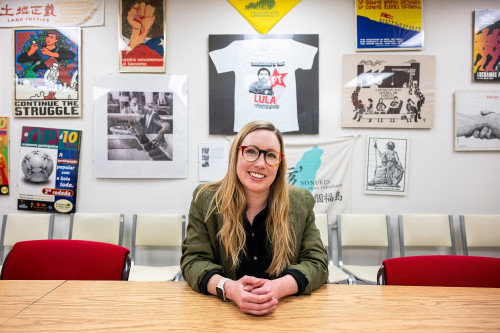
Katherine Jensen is pictured in a graduate seminar classroom in Sewell Social Sciences. Photo: Jeff Miller
Jensen has an extraordinary ability to cultivate curiosity in her students. She combines a command of her subject matter with a communication style that engages students and demystifies otherwise difficult and complicated academic material. A central principle that shines through her teaching is her persistent call for students to question taken-for-granted ideas and beliefs. One way she does this is through free associations in which she asks students to share what comes to mind when they think of a refugee or a migrant, for example. These kinds of activities not only encourage students to participate in their own learning, something that is hard in a 300-person lecture, but also importantly to spark multifaceted and far-ranging discussions. The way Jensen teaches not only models a persistent commitment to critical thinking but also teaches students how they can hone these analytical skills.
EXCELLENCE IN COMMUNITY-BASED LEARNING TEACHING AWARD
Associate professor of counseling psychology
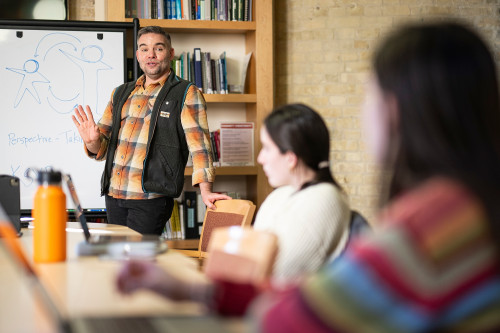
Travis Wright teaches a class in the Red Gym. Photo: Bryce Richter
A centerpiece of Wright’s contributions to UW–Madison and the larger Madison community has been his partnership with the Madison Metropolitan School District (MMSD), initially funded by a Baldwin Award, to develop the BASES (Building Academic, Social, and Emotional Supports) project — a mentoring and teacher development program aimed at improving outcomes for children experiencing homelessness. The BASES project has facilitated over 14,000 hours of direct student support in MMSD classrooms over the past 11 years. This initiative grew out of Wright’s research on resilience and the importance of the student-teacher relationship, and it embodies the Wisconsin Idea of putting research into action to benefit the community. Wright clearly believes each of us can change the world and inspires students to make a difference in the lives of others.
VAN HISE OUTREACH TEACHING AWARD
Professor of crops and soils, Division of Extension in Chippewa County
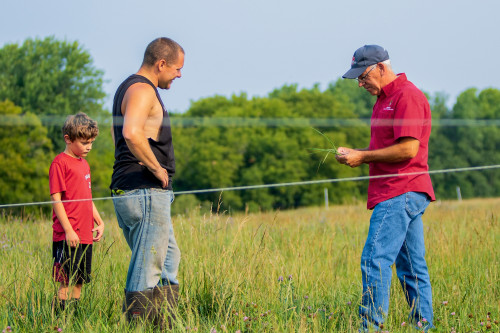
Jerome Clark, right, talks with a farmer and child in Chippewa County.
Clark connects farmers, agriculture industry representatives, clients in Dunn, Eau Claire and Chippewa counties and stakeholders across the state of Wisconsin and throughout the nation with UW–Madison research and resources. To do this, he has adopted new teaching methods, including podcasts like “The Cutting Edge: Podcasts for New Crops in Wisconsin,” as a way of reaching new audiences. He also dedicates a significant part of his teaching efforts to reaching underrepresented audiences. His work to translate two Canvas courses into Spanish and to offer live interpretation (virtual and in-person) has resulted in improved outcomes in manure application safety for Latinx farmers and their employees. He has also worked with members of the Ho-Chunk Nation to learn and apply culturally relevant practices related to the manufacturing of hemp grain and fiber that benefited both the industry and the tribe. His service has provided him with the opportunity to coach many new agricultural educators and college interns as they begin their careers with the Division of Extension.
WILLIAM H. KIEKHOFER TEACHING AWARD
Associate professor of integrative biology
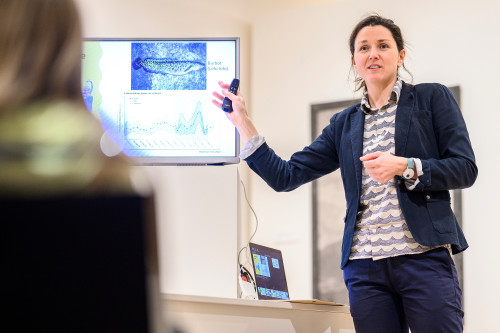
Hilary Dugan gives a public talk titled “Science on Ice: Why Winter is the New Frontier for Freshwater Sciences” at the James Watrous Gallery in the Overture Center for the Arts. Photo: Althea Dotzour
Dugan stands out for her devotion to her students as individuals. She is committed to supporting students from underrepresented groups and works to create an inclusive environment and expand scientific opportunities. Dugan views teaching as an important part of her scholarship and is incredibly effective at passing her understanding and enthusiasm for lakes, data analysis and science on to her students. Her course content is designed to be relevant to students’ lives and experiences. She intersperses creative activities with more traditional lectures and uses innovative assessment strategies to ensure students are understanding the material. Dugan actively seeks input about how to improve her teaching and readily implements changes that she feels will improve student learning. Undergraduates become fully integrated into Dugan’s research group, gaining experience that helps launch them into top graduate programs and careers in the field.
Tags: faculty awards, learning




